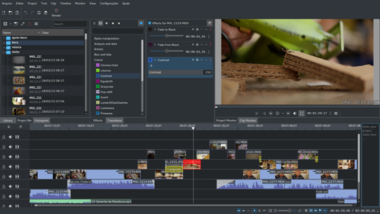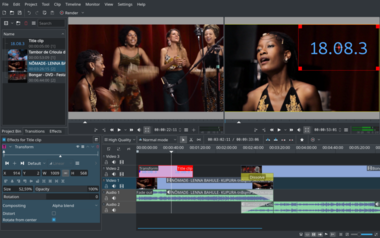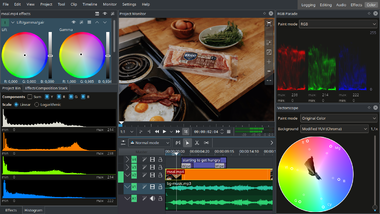Kdenlive
La descripción oficial para este tipo de aplicación es editor de vídeo no lineal, que significa que edita tu película de forma no destructiva. El original no se toca. La aplicación registra los detalles de los bits que quieres en tu archivo final, y la salida se crea por la combinación del archivo original y de ese archivo de edición.
- Compatible con una amplia gama de webcams, cámaras y videocámaras
- Puede procesar archivos AVI de baja resolución y Vídeo de Alta Definición de las cámaras profesionales.
- El formato multi-pista permite interpolación de vídeo y audio
- Los archivos de audio, en multi-pistas, pueden ser cortados para sincronizarse con el vídeo
- Se incluye una amplia gama de efectos y transiciones
- Se pueden usar efectos y transiciones personalizadas
- Posibilidad de salida a una gran cantidad de formatos estándar
- DV (PAL o NTSC)
- Mpeg2 (PAL, NTSC y HDV) y AVCHD (HDV)
- h264 con alta calidad
- Permite la mezcla de distintos tipos de medios, compatible con muchos codecs y formatos
- Vídeo Mpeg2, mp4 y h264
- Audio Mp2, mp3 y ac3
- Vídeo sin pérdida (códec sin pérdida SNOW, etc ...)
- Vídeo libre (Ogg vorbis, etc ...)
- Total posibilidad de deshacer, para librarte de la ansiedad
- Exportación a muchos formatos, incluyendo a páginas web de Internet como Dailymotion, Vimeo y Youtube a través de ajustes preestablecidos
History
The Kdenlive project started in 2002 by Jason Wood.
The port to KDE4 started in 2008[1] by Jean-Baptiste Mardelle. This was an almost complete rewrite from the KDE3 version, that wasn't originally made to work with MLT. The KDE4 rewrite was finished in November 2008, with the release of Kdenlive 0.7[2]
During the Randa meeting in August 2014, Kdenlive developers discussed the possibility to make Kdenlive an official KDE project.[3].
In 2017, the development team of Kdenlive started a big refactoring of the timeline feature[4]. The refactoring moves the timeline feature to QML and allows better code maintainability. The refactoring ended in April 2019 with a sprint in Lyon[5].
Screenshot
Some screenshot
Learn Kdenlive with:
- QuickStart for a short hands-on tutorial.
- Manual for elaborate description of Kdenlive.
- Tutorials mostly for learning specific tools or effects.
- kdenlivetutorials.com contains many tutorials.
- Arkengheist 2.0 (Youtube) Kdenlive Tutorials howto do's and tips & tricks
Getting involved
Get involved by contributing to this documentation, joining the community wiki and reporting issues.
Press coverage
Linux Journal escribió un completo análisis, que terminó con el veredicto "Hay mucho que gusta de Kdenlive, y a mi me encanta. Su conjunto de características es lo bastante completo como para satisfacer las necesidades básicas de producción de vídeo de escritorio, y su forma de trabajar es sencilla y fácil de aprender."
Installation/Download
Kdenlive is available in multiple GNU/Linux distribution repositories, but also as Appimage, Flatpack and Snap. Kdenlive is also available for Windows and old version are also available for MacOS. For more information consult the Kdenlive download page.
You can also directly compile from source, in this case consult the developer wiki for Linux build and this blog post for Windows build.





